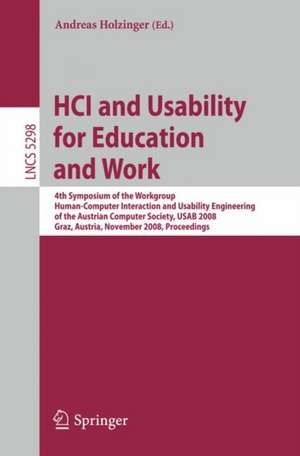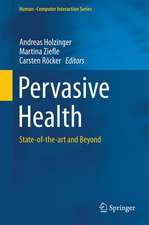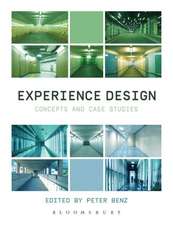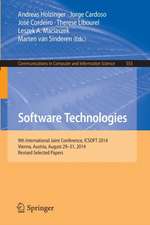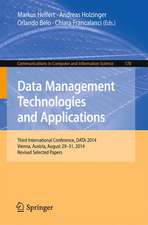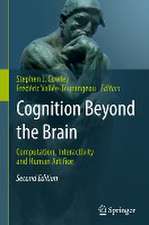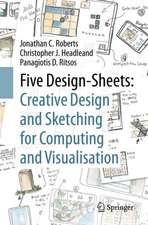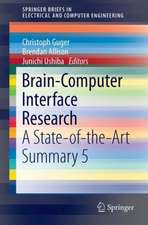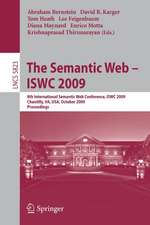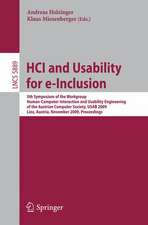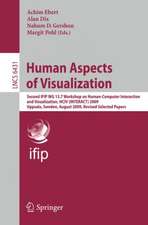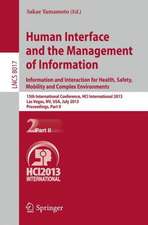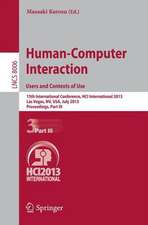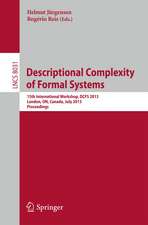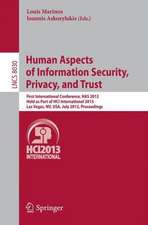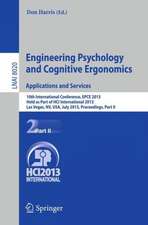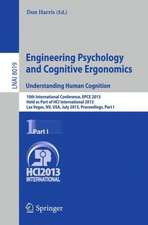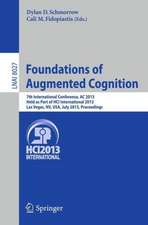HCI and Usability for Education and Work: 4th Symposium of the Workgroup Human-Computer Interaction and Usability Engineering of the Austrian Computer Society, USAB 2008, Graz, Austria, November 20-21, 2008, Proceedings: Lecture Notes in Computer Science, cartea 5298
Editat de Andreas Holzingeren Limba Engleză Paperback – 13 noi 2008
Din seria Lecture Notes in Computer Science
- 20%
 Preț: 1061.55 lei
Preț: 1061.55 lei - 20%
 Preț: 307.71 lei
Preț: 307.71 lei - 20%
 Preț: 438.69 lei
Preț: 438.69 lei - 20%
 Preț: 645.28 lei
Preț: 645.28 lei -
 Preț: 410.88 lei
Preț: 410.88 lei - 15%
 Preț: 580.46 lei
Preț: 580.46 lei - 17%
 Preț: 427.22 lei
Preț: 427.22 lei - 20%
 Preț: 596.46 lei
Preț: 596.46 lei -
 Preț: 449.57 lei
Preț: 449.57 lei - 20%
 Preț: 353.50 lei
Preț: 353.50 lei - 20%
 Preț: 1414.79 lei
Preț: 1414.79 lei - 20%
 Preț: 309.90 lei
Preț: 309.90 lei - 20%
 Preț: 583.40 lei
Preț: 583.40 lei - 20%
 Preț: 1075.26 lei
Preț: 1075.26 lei - 20%
 Preț: 310.26 lei
Preț: 310.26 lei - 20%
 Preț: 655.02 lei
Preț: 655.02 lei - 20%
 Preț: 580.93 lei
Preț: 580.93 lei - 20%
 Preț: 340.32 lei
Preț: 340.32 lei - 18%
 Preț: 938.83 lei
Preț: 938.83 lei - 20%
 Preț: 591.51 lei
Preț: 591.51 lei - 15%
 Preț: 438.59 lei
Preț: 438.59 lei - 20%
 Preț: 337.00 lei
Preț: 337.00 lei -
 Preț: 389.48 lei
Preț: 389.48 lei - 20%
 Preț: 607.39 lei
Preț: 607.39 lei - 20%
 Preț: 1024.44 lei
Preț: 1024.44 lei - 20%
 Preț: 579.30 lei
Preț: 579.30 lei - 20%
 Preț: 763.23 lei
Preț: 763.23 lei - 20%
 Preț: 453.32 lei
Preț: 453.32 lei - 20%
 Preț: 575.48 lei
Preț: 575.48 lei - 20%
 Preț: 585.88 lei
Preț: 585.88 lei - 20%
 Preț: 825.93 lei
Preț: 825.93 lei - 20%
 Preț: 763.23 lei
Preț: 763.23 lei - 17%
 Preț: 360.19 lei
Preț: 360.19 lei - 20%
 Preț: 1183.14 lei
Preț: 1183.14 lei - 20%
 Preț: 340.32 lei
Preț: 340.32 lei - 20%
 Preț: 504.57 lei
Preț: 504.57 lei - 20%
 Preț: 369.12 lei
Preț: 369.12 lei - 20%
 Preț: 583.40 lei
Preț: 583.40 lei - 20%
 Preț: 343.62 lei
Preț: 343.62 lei - 20%
 Preț: 350.21 lei
Preț: 350.21 lei - 20%
 Preț: 764.89 lei
Preț: 764.89 lei - 20%
 Preț: 583.40 lei
Preț: 583.40 lei - 20%
 Preț: 649.49 lei
Preț: 649.49 lei - 20%
 Preț: 341.95 lei
Preț: 341.95 lei - 20%
 Preț: 238.01 lei
Preț: 238.01 lei - 20%
 Preț: 538.29 lei
Preț: 538.29 lei
Preț: 344.42 lei
Preț vechi: 430.53 lei
-20% Nou
Puncte Express: 517
Preț estimativ în valută:
65.90€ • 68.99$ • 54.53£
65.90€ • 68.99$ • 54.53£
Carte tipărită la comandă
Livrare economică 07-21 aprilie
Preluare comenzi: 021 569.72.76
Specificații
ISBN-13: 9783540893493
ISBN-10: 3540893490
Pagini: 508
Ilustrații: XVI, 488 p.
Dimensiuni: 155 x 235 x 33 mm
Greutate: 0.75 kg
Ediția:2008
Editura: Springer Berlin, Heidelberg
Colecția Springer
Seriile Lecture Notes in Computer Science, Programming and Software Engineering
Locul publicării:Berlin, Heidelberg, Germany
ISBN-10: 3540893490
Pagini: 508
Ilustrații: XVI, 488 p.
Dimensiuni: 155 x 235 x 33 mm
Greutate: 0.75 kg
Ediția:2008
Editura: Springer Berlin, Heidelberg
Colecția Springer
Seriile Lecture Notes in Computer Science, Programming and Software Engineering
Locul publicării:Berlin, Heidelberg, Germany
Public țintă
ResearchCuprins
Cognitive Processes and End User Experience.- Learners, Technology and the Brain.- Challenges in the Development and Evaluation of Immersive Digital Educational Games.- Evaluating the Motivational Value of an Augmented Reality System for Learning Chemistry.- Cognitive Processes Causing the Relationship between Aesthetics and Usability.- Educational Uses of the e-Book: An Experience in a Virtual University Context.- Construction and Evaluation of a User Experience Questionnaire.- Social Software and Collaborative Knowledge Development.- Integration of a Wiki for Collaborative Knowledge Development in an E-Learning Context for University Teaching.- Web 2.0 and Social Software: Challenges and Complexity of Communication in Education.- Using ePortfolios Enhancing for Learning through Computer-Mediated Interaction in a Course on HCI.- Knowledge Processing, Assessment and Human Performance.- Knowledge-Based Patterns of Remembering: Eye Movement Scanpaths Reflect Domain Experience.- Knowledge Assessment Based on Evaluation of 3D Graphics Annotation in Lesson Context.- The Influence of Instruction Mode on Reaching Movements during Manual Assembly.- Usability Metrics of Time and Stress - Biological Enhanced Performance Test of a University Wide Learning Management System.- Human Centered Development and Design Accessibility.- Users’ Experience with a Recommender System in an Open Source Standard-Based Learning Management System.- The Role of Usability in the Design and Evaluation of Dynamic Traffic Displays.- Affordances in Conversational Interactions with Multimodal QA Systems.- E-Learning: A Tool for Teachers with a Disability.- More Than Just a Game: Accessibility in Computer Games.- User Centred Information Visualization and Multimedia.- Visualizations at First Sight: DoInsights Require Training?.- PowerPoint Multimedia Presentations in Computer Science Education: What Do Users Need?.- Analysis of Ontology Visualization Techniques for Modular Curricula.- Agile User-Centered Design Applied to a Mobile Multimedia Streaming Application.- Adaptivity and Personalization in Ubiquitous Learning Systems.- Adaptivity and Personalization in Ubiquitous Learning Systems.- Instruction Formats and Navigation Aids in Mobile Devices.- HCI Research for E-Learning: Adaptability and Adaptivity to Support Better User Interaction.- Personalized E-Learning through Environment Design and Collaborative Activities.- Avatars in Assistive Homes for the Elderly.- Using Clustering Technique for Students’ Grouping in Intelligent E-Learning Systems.- Adaptation Criteria for Preparing Learning Material for Adaptive Usage: Structured Content Analysis of Existing Systems.- Human Centred Design for Safety Critical Systems.- How Image Based Factors and Human Factors Contribute to Threat Detection Performance in X-Ray Aviation Security Screening.- A Process for Human Centered Modelling of Incident Scenarios.- Design Patterns Applied in a User Interface Design (UID) Process for Safety Critical Environments (SCEs).- Under Watch and Ward at Night: Design and Evaluation of a Remote Monitoring System for Dementia Care.
Textul de pe ultima copertă
This book constitutes the refereed proceedings of the 4th Usability Symposium of the Human-Computer Interaction and Usability Engineering Workgroup of the Austrian Computer Society, USAB 2008, held in Graz, Austria, in November 2008.
The 7 revised full papers and 26 revised short papers presented were carefully reviewed and selected from 85 submissions. The papers are organized in topical sections on cognitive processes and end user experience, social software and collaborative knowledge development, knowledge processing, assessment and human performance, human centered development and design accessibility, user centred information visualization and multimedia, adaptivity and personalization in ubiquitous learning systems, and human centred design for safety critical systems.
The 7 revised full papers and 26 revised short papers presented were carefully reviewed and selected from 85 submissions. The papers are organized in topical sections on cognitive processes and end user experience, social software and collaborative knowledge development, knowledge processing, assessment and human performance, human centered development and design accessibility, user centred information visualization and multimedia, adaptivity and personalization in ubiquitous learning systems, and human centred design for safety critical systems.
